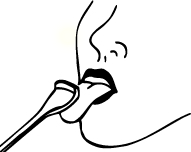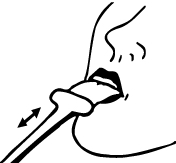Education
About Cracked Teeth
Tooth fractures are common in every dental practice. Most people associate cracked teeth with an accident or injury to an anterior or front tooth. While this is a common occurrence, most dentists find fractures in the posterior teeth or molars. This type of fracture is most associated with “cracked tooth syndrome”.
Tooth fractures can be caused by many reasons:
Abnormal teeth grinding (bruxism)
Chewing or biting on hard surfaces (ice, popcorn kernels or hard candy)
Large fillings (amalgams) or other restorations which weaken tooth structure
Change in mouth temperatures (drinking hot coffee then a cold beverage)
An injury to the mouth
Fractured or cracked teeth are difficult to diagnose because they do not necessarily show up on x-rays and may be difficult to see upon examination of the mouth. However, tooth fractures generally have the following signs and symptoms:
Sensitivity to hot and/or cold food or beverage
Intermittent pain upon chewing or biting

IMPORTANT: There are many other causes of mouth pain and only a dentist is qualified to determine if your mouth pain is associated with a cracked tooth.
About Oral Hygiene
WHY DO I NEED TO CLEAN MY TONGUE? Like millions of people, you may not realize how important a clean tongue contributes to good oral health. The tongue, like other parts of your body, needs to be cleaned every day. A tongue collects debris on a daily basis. This debris consists of food particles and bacteria which manufacture plaque on the tongue. Your tongue may have a white or gray appearance. This white or gray matter may be the cause of bad breath and/or contribute to gum disease and tooth decay.
WHO CAN BENEFIT FROM USING A TONGUE CLEANER/SCRAPER? Everyone! Tongue cleaning, together with brushing and flossing, can help eliminate plaque and contribute to fresh breath. In addition, people with special needs can also benefit—the elderly, the physically challenged, or those people taking certain medications that coat the tongue surface. It is advisable to speak with your dentists or hygienist about the oral hygiene of your tongue.
I BRUSH MY TONGUE WITH A TOOTHBRUSH. IS A TONGUE CLEANER/ SCRAPER BETTER? Even if you brush your tongue with a toothbrush, millions of micro-organisms may be left on the tongue. Why? Visualize removing water from a glass surface using a brush—it does not work well. A squeegee is more effective. As this example shows, a toothbrush may remove some plaque from the tongue, but tongue cleaners/scrapers are designed to scrape and move plaque off the tongue surface in a forward motion. Also, some tongue cleaners have multi-cleaning features which can reduce even heavy tongue plaque. If you have a problem with bad breath, gag easily from cleaning your tongue with a toothbrush, or just want to feel more confident about your oral hygiene, then a tongue cleaner may be beneficial. Chewing or biting on hard surfaces (ice, popcorn kernels or hard candy)




Please note: Bad breath may be attributed to other causes, like diabetes, or other medical conditions; so if you are affected by chronic bad breath, it is advisable to consult with your dentist or physician.
Using a tongue cleaner/scraper daily can eliminate tongue plaque and prevent oral hygiene problems before they develop. You will also notice a fresh clean feeling in your mouth after only a few uses. Make tongue cleaning a part of your daily routine for FRESH BREATH AND GOOD ORAL HEALTH